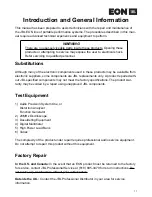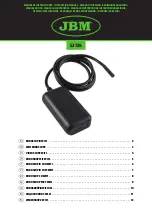
Subject to change without notice
14
setting. An additional arrow symbol which points to the
left is displayed to indicate post trigger operation. In
POST TRIGGER condition the arrow symbol does not
indicate a wrong
X-POS.
setting. A minus sign (-) placed
in front of the percentage value, is displayed by the
readout for POST TRIGGER mode indication.
Proceeding from 100% pre trigger, the instrument swit-
ches over to
75% POST TRIGGER (”PT-75%”)
after
the PTR pushbutton is pressed. Then the trigger point
is 7.5 div to the left of the trace start on the screen.
This means that the signal capture starts 7.5 x time
deflection coefficient after the trigger event occurred.
Every time the
PTR
pushbutton is pressed the POST
TRIGGER value changes in 25% steps until PTR-25% is
active. When the PTR pushbutton is pressed again, both
post and pre trigger are switched off and the readout
indicates
”PT0%”
.
Attention!
In time base settings from 100s/div to 50ms/div the
pre- or post trigger is automatically switched off
(”PT0%) if refresh (RFR), envelope (ENV) or average
(AVM) mode is active. This is to avoid excessive wai-
ting times.
If the pre- or post trigger function is required in combi-
nation with those time coefficients,
SINGLE (SGL)
mode
operation must be used.
PK Det
Pressing and holding switches the peak value detection
(
“PK Det”
= peak detect) on or off. This function is
available only with deflection coefficients from 100s/div
to 5µs/div in combination with REFRESH, ENVELOPE,
ROLL or SINGLE modes.
“PK Det”
will be disabled
automatically if AVERAGE mode is active or a time
coefficient from 2µs/div to 100ns/div is chosen.
The
“PK Det”
function is indicated by the time coefficient
display in the readout. Switching
“PK Det”
on, changes
from e.g.
“A:20ms”
to
“P:20ms”
and consequently in
B time base mode from
“B:100µs”
to
“P:100µs”
.
In
alternate
(A and B) time base mode, the
“PK Det”
function only affects the A time base and the readout
displays e.g.
“P:20ms”
and
“B:100µs”
.
In
“PK Det”
operation the sampling rate is always 40MS/
s and the signal will be sampled every 25ns. The advan-
tage of this sampling method is as follows:
Without
“PK Det”
and a time coefficient of 100s/div,
the signal is sampled every 0.5 seconds (2 Samples/
second) and stored at a new address. A signal amplitude
change with a duration of e.g. 30ns appearing 0.2 se-
conds after the last sampling procedure will not be cap-
tured. In combination with
“PK Det”
the sampling
interval is reduced to 25ns and then the samples will be
evaluated and the most deviating value captured within
0.5s after the last storage procedure, will be stored at
the next address.
(9) STOR. MODE
- Pushbuttons with associated LEDs.
These functions are not available in analog mode.
If digital
SINGLE (SGL)
mode has not been chosen,
one of the associated LEDs is lit. The signal capture and
display mode can be selected by pressing one of the
pushbuttons. The mode setting is indicated by one of
the LEDs (
RFR, ENV, AVM
and
ROL
) and also displayed
by the readout. The only exception is in
XY
storage
mode. Then the
RFR-LED
is lit and the readout displays
XY
. No other signal capture and display mode can be
chosen in XY mode.
The desired Yt signal capture mode can be selected by
pressing the upper or lower
STOR. MODE
pushbutton.
The following description presumes that
HOLD (HLD)
is not activated and the trigger conditions are met.
(9)
RFR
- stands for refresh operation. In this mode, as in
analog mode, periodically repeating signals can be
captured and displayed.
The signal acquisition is started by triggering the digital
time base. Then the previously captured and displayed
signal will be overwritten with the current signal. This
will be displayed until the digital time base is triggered
again. This is in contrast to analog operation where the
screen remains blank when the time base is not
triggered.
In refresh mode, the signal acquisition can be effected
with pre- or post triggering when a time base between
20ms/div and 100ns/div is selected. The pre triggering
or post triggering will be automatically switched off
(PT0%), with larger time coefficients (100s/div to 50ms/
div) in order to avoid excessive waiting times. If it is
required to measure with pre- or post trigger in this time
base range, one should select single shot
(SINGLE =
SGL)
.
In XY digital mode the
RFR-LED
lights. It indicates a
continuous, trigger independent signal acquisition. The
trigger circuit is switched off.
(9)
ENV
- is the abbreviation for
ENVELOPE
operation.
In this mode the minimum and maximum values of the
signal during several signal acquisitions will be deter-
mined and displayed. Except for this display, the ENVE-
LOPE operation is identical to the refresh operation.
Changes in the signal are easier to measure and are
more visible in ENVELOPE operation. This is valid not
only for amplitude changes but also for frequency
variations (Jitter).
The ENVELOPE evaluation begins anew when the
SINGLE (10) pushbutton
is pressed briefly, to actuate
the
RESET (RES)
function.
Attention!
The pre- or post trigger will be automatically switched
off (PT0%) in the time base range from 100s/div to
50ms/div.
(9)
AVM
- indicates
AVERAGE
(mean value) mode.
This operation is effective when the AVM-LED lights up
and the readout displays
AV...
.
In this case also several signal acquisition scans are
required; hence, it is similar to Refresh operation. The
signal is averaged over the several acquisitions so that
Controls and Readout















































